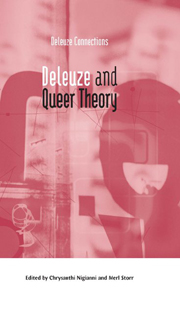Book contents
- Frontmatter
- Contents
- Introduction
- 1 On the Very Possibility of Queer Theory Claire Colebrook
- 2 Thirty-six Thousand Forms of Love: The Queering of Deleuze and Guattari
- 3 The Sexed Subject in-between Deleuze and Butler Anna Hickey-Moody and Mary Lou Rasmussen
- 4 Every ‘One’ – a Crowd, Making Room for the Excluded Middle
- 5 The Adventures of a Sex
- 6 Queer Hybridity
- 7 Prosthetic Performativity: Deleuzian Connections and Queer Corporealities
- 8 Unnatural Alliances
- 9 Schreber and the Penetrated Male
- 10 Butterfly Kiss: The Contagious Kiss of Becoming-Lesbian Chrysanthi Nigianni
- Notes on Contributors
- Index
10 - Butterfly Kiss: The Contagious Kiss of Becoming-Lesbian Chrysanthi Nigianni
Published online by Cambridge University Press: 12 September 2012
- Frontmatter
- Contents
- Introduction
- 1 On the Very Possibility of Queer Theory Claire Colebrook
- 2 Thirty-six Thousand Forms of Love: The Queering of Deleuze and Guattari
- 3 The Sexed Subject in-between Deleuze and Butler Anna Hickey-Moody and Mary Lou Rasmussen
- 4 Every ‘One’ – a Crowd, Making Room for the Excluded Middle
- 5 The Adventures of a Sex
- 6 Queer Hybridity
- 7 Prosthetic Performativity: Deleuzian Connections and Queer Corporealities
- 8 Unnatural Alliances
- 9 Schreber and the Penetrated Male
- 10 Butterfly Kiss: The Contagious Kiss of Becoming-Lesbian Chrysanthi Nigianni
- Notes on Contributors
- Index
Summary
Art is never an end in itself. It is only an instrument for tracing lines of lives, that is to say, all these real becomings that are not simply produced in art, all these active flights that do not consist in fleeing into art … but rather sweep it away with them toward the realms of the asignifying, the asubjective … (Deleuze and Guattari 2003: 187)
This essay will attempt to conduct a twofold experiment: on the one hand, it will attempt to make the shift from a psychoanalytic thinking about lesbianism as identity corresponding to a certain psycho-social mode of ‘being a lesbian’, to a schizoanalytic thinking that conceives of it as a becoming-lesbian, a schizophrenic process that constitutes ‘a rupture, an eruption, a break-through which smashes the continuity of personality and takes it on a kind of trip through “more reality” ’ (Deleuze 2006: 27). The essay will thus argue for a ‘schizophrenic’ lesbian desire not in its clinical but in its critical meaning: an ‘anoedipal, schizoid, included, and inclusive’ desire whose excess (rather than lack) violates strict definitions and exceeds linguistic meaning and signifiers; a desire whose ‘meaning’ can be nothing else than its forces and effects.
Deleuze's use of medical terms in philosophy resonates with his belief that philosophy, art and science, although distinct and autonomous, necessarily enter into relations of mutual resonance and exchange.
- Type
- Chapter
- Information
- Deleuze and Queer Theory , pp. 168 - 182Publisher: Edinburgh University PressPrint publication year: 2009



